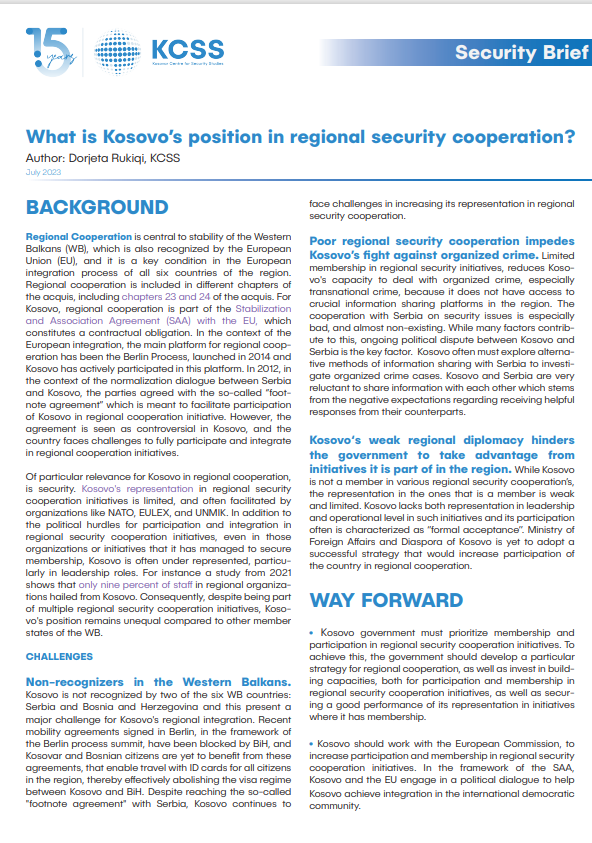27/07/2023

Vërejtje: Ky shkrim momentalisht është vetëm në versionin Anglisht.
Autore: Dorjeta Rukiqi
BACKGROUND
Regional Cooperation is central to stability of the Western Balkans (WB), which is also recognized by the European Union (EU), and it is a key condition in the European integration process of all six countries of the region. Regional cooperation is included in different chapters of the acquis, including chapters 23 and 24 of the acquis. For Kosovo, regional cooperation is part of the Stabilization and Association Agreement (SAA) with the EU, which constitutes a contractual obligation. In the context of the European integration, the main platform for regional cooperation has been the Berlin Process, launched in 2014 and Kosovo has actively participated in this platform. In 2012, in the context of the normalization dialogue between Serbia and Kosovo, the parties agreed with the so-called ‘’footnote agreement’’ which is meant to facilitate participation of Kosovo in regional cooperation initiative. However, the agreement is seen as controversial in Kosovo, and the country faces challenges to fully participate and integrate in regional cooperation initiatives.
Of particular relevance for Kosovo in regional cooperation, is security. Kosovo's representation in regional security cooperation initiatives is limited, and often facilitated by organizations like NATO, EULEX, and UNMIK. In addition to the political hurdles for participation and integration in regional security cooperation initiatives, even in those organizations or initiatives that it has managed to secure membership, Kosovo is often under represented, particularly in leadership roles. For instance a study from 2021 shows that only nine percent of staff in regional organizations hailed from Kosovo. Consequently, despite being part of multiple regional security cooperation initiatives, Kosovo's position remains unequal compared to other member states of the WB.
CHALLENGES
Non-recognizers in the Western Balkans
Kosovo is not recognized by two of the six WB countries: Serbia and Bosnia and Herzegovina and this present a major challenge for Kosovo's regional integration. Recent mobility agreements signed in Berlin, in the framework of the Berlin process summit, have been blocked by BiH, and Kosovar and Bosnian citizens are yet to benefit from these agreements, that enable travel with ID cards for all citizens in the region, thereby effectively abolishing the visa regime between Kosovo and BiH. Despite reaching the so-called "footnote agreement" with Serbia, Kosovo continues to face challenges in increasing its representation in regional security cooperation.
Poor regional security cooperation impedes Kosovo’s fight against organized crime
Limited membership in regional security initiatives, reduces Kosovo's capacity to deal with organized crime, especially transnational crime, because it does not have access to crucial information sharing platforms in the region. The cooperation with Serbia on security issues is especially bad, and almost non-existing. While many factors contribute to this, ongoing political dispute between Kosovo and Serbia is the key factor. Kosovo often must explore alternative methods of information sharing with Serbia to investigate organized crime cases. Kosovo and Serbia are very reluctant to share information with each other which stems from the negative expectations regarding receiving helpful responses from their counterparts.
Kosovo‘s weak regional diplomacy hinders the government to take advantage from initiatives it is part of in the region
While Kosovo is not a member in various regional security cooperation’s, the representation in the ones that is a member is weak and limited. Kosovo lacks both representation in leadership and operational level in such initiatives and its participation often is characterized as ‘’formal acceptance’’. Ministry of Foreign Affairs and Diaspora of Kosovo is yet to adopt a successful strategy that would increase participation of the country in regional cooperation.
WAY FORWARD
Kosovo government must prioritize membership and participation in regional security cooperation initiatives. To achieve this, the government should develop a particular strategy for regional cooperation, as well as invest in building capacities, both for participation and membership in regional security cooperation initiatives, as well as securing a good performance of its representation in initiatives where it has membership.
Kosovo should work with the European Commission, to increase participation and membership in regional security cooperation initiatives. In the framework of the SAA, Kosovo and the EU engage in a political dialogue to help Kosovo achieve integration in the international democratic community.